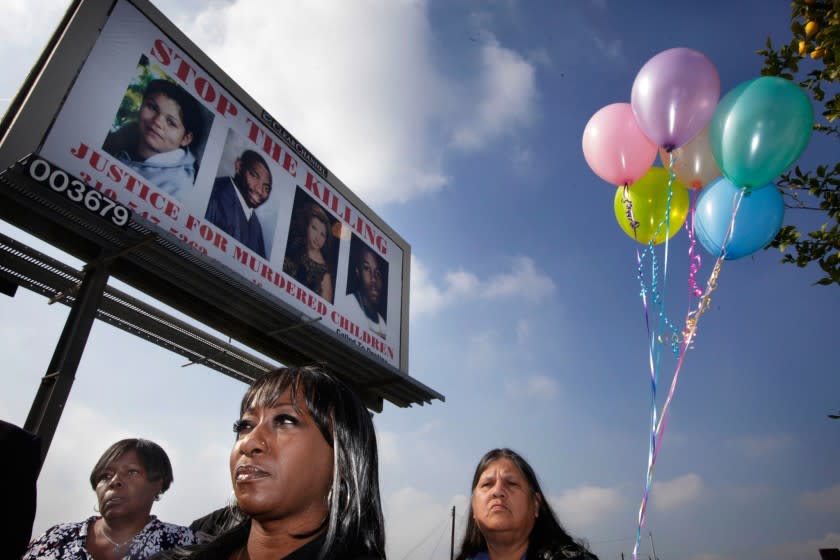Vicky Lindsey, Compton's passionate advocate for mothers of homicide victims, dies

Vicky Denise Lindsey had a saying: Get involved by choice, not by force.
Lindsey lived by her own mantra. Even before her 19-year-old son, Lionel E.L. Whiteside Jr., was killed in November 1995 after attending a high school football game, she was involved in anti-violence efforts in her Compton neighborhood.
Over the years, Lindsey could be seen at candlelight vigils, crime scenes or huddled with support groups, offering solace to bereaved mothers of homicide victims. Lindsey also became a respected advocate for survivors of violence, often working to connect families to resources while educating the community about the toll a homicide can take on a mother.
“She was an advocate for victims no matter what the circumstances were," said Ben Owens, a longtime gang intervention worker.
Lindsey, 62, died at Torrance Memorial Hospital on Aug. 2 after a prolonged battle with breast cancer, said longtime friend and Compton activist Pamela Carolina. Lindsey had also contracted COVID-19.
Lindsey is survived by her son, Lijuan Stephens and his wife DeNika, grandchildren Lijuan Stephens Jr. and Lionel Whiteside III, and siblings Deborah and Edward Lindsey.
So sad to hear about the passing of a soldier Vicky Lindsey. She took some kid from philly under her wing, put me to work in Watts and Compton, and raised me in the movement. I opened my scrapbook and took a trip down memory lane. Rest in power pic.twitter.com/DaBTXghTPD
— Andi Perez (@AndiPerez) August 8, 2020
A former bus driver, Lindsey's journey into activism began in 1988, when, along with Carolina, she started the group Mothers Against Gangs in Communities. In addition to conducting support groups, the two would meet with teenagers at a youth correctional facility in Whittier to talk about the consequences of gang life.
"We were tired of hearing about young kids getting murdered on a daily basis," Carolina said.
Lindsey also wrote poetry inspired by what she saw in her life and on her bus route: homelessness, gangs and unemployment. She wrote eulogies for funerals, for friends and for friend of friends.
When Lorna Hawkins' son was killed in 1988, Lindsey and Carolina invited her to a support group for mothers.
“That was back in the days when no one wanted to talk about it,” said Hawkins, who lived through the killing of a second son years later. “You were supposed to grieve in silence.”
The meeting inspired Hawkins to get involved. She started a cable TV show called “Drive-by Agony.”
After Lindsey's son was killed, she was disheartened by the bureaucracy of the police investigation. She came to see law enforcement as being insensitive, vague and thought detectives failed to prioritize her son's case, Carolina said.
Lindsey began working to make sure the voices of others were heard. And she often got up in the middle of the night to go to crime scenes with the goal of consoling yet another heartbroken mother. She became involved with a multitude of community organizations and started her own group, Project Cry No More.
Lindsey also worked to make sure that clergy, law enforcement and intervention workers understood how a killing affects a mother. She worked to help perpetrators understand the far-reaching impacts of violence.
At a 2005 meeting of former and current gang members working for peace in the streets, Lindsey wasn't invited, but she came anyway.
"I believe she was the only female there," Owens said.
The meetings would evolve into the Southern California Cease Fire Committee. Lindsey became a board member.
"You couldn't tell her no," said Skipp Townsend, a gang intervention worker. Townsend recalled a series of peace breakfasts that the two organized in Compton. Lindsey would share her experience as a mother of a child lost to violence.
"She would get everybody crying," Townsend said.
Lindsey often corrected those who said they were sorry for a person's loss. She would say: My child isn't lost, he can't come back. He was murdered.
“Vicky became passionate about making sure nobody experienced what she had to experience during the death of her son," Carolina said.

